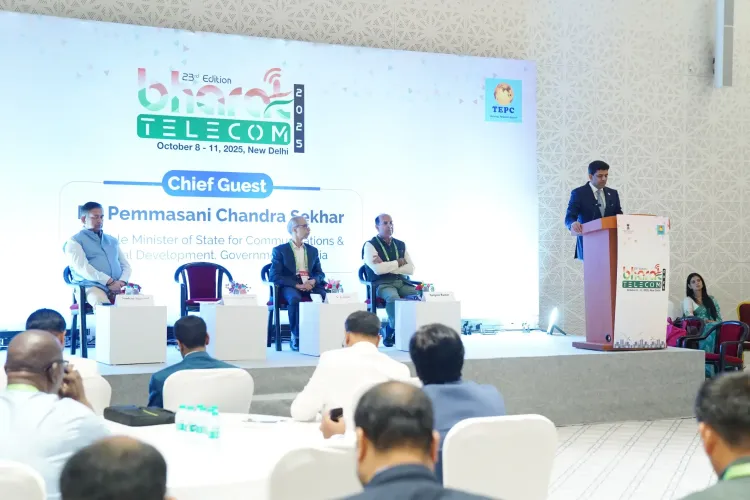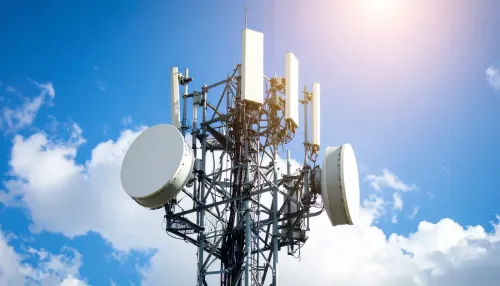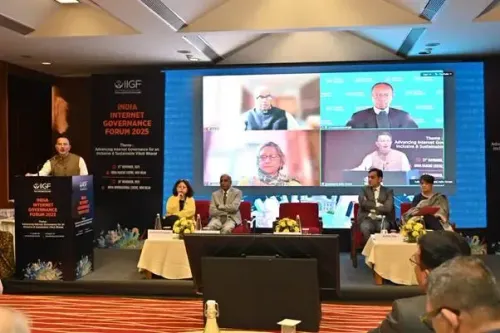Has India Emerged as a Global Hub for Telecom Innovation?

Synopsis
Key Takeaways
- India's evolution in the telecom sector emphasizes its capabilities in design and innovation.
- The event showcased over 60 Indian telecom companies and their advanced products.
- Government initiatives are driving substantial investments in local manufacturing.
- Collaboration is key for both domestic and international stakeholders.
- India is committed to becoming a trusted global partner in technology.
New Delhi, Oct 9 (NationPress) India has evolved from being primarily a product assembly hub to a nation celebrated for its design, development, and innovation, as stated by the government on Thursday.
During the inauguration of ‘Bharat Telecom 2025’ at the India Mobile Congress (IMC) 2025, Minister of State for Communications, Dr Pemmasani Chandra Sekhar, declared that India is swiftly becoming a global center for telecom innovation, design, and manufacturing. The country is advancing beyond mere device assembly to establish itself as a leader in design, development, and innovation.
The Telecom Equipment and Services Export Promotion Council (TEPC) hosted the 23rd edition of Bharat Telecom 2025, which is a global buyer-seller meeting.
Over 70 delegates from more than 30 nations participated in the event, where over 60 Indian telecom companies displayed their cutting-edge products and capabilities at the ‘Atmanirbhar Bharat Pavilion’ organized by TEPC.
This event acted as a vibrant platform for potential buyers and stakeholders worldwide to delve into India’s expanding telecom ecosystem.
The minister underscored India’s escalating significance as a reliable global partner in technology and telecom, asserting, “India is transitioning from simply assembling products to being recognized for design, development, and innovation. Our aim is to create opportunities for all service providers and exporters by providing access to new markets and fortifying the innovation and manufacturing ecosystem.”
He further emphasized the government’s unwavering commitment to promoting collaboration among international investors, technology providers, and Indian firms.
Dr. Sekhar noted that initiatives like the National Digital Communications Policy and the production-linked incentive (PLI) scheme are catalyzing substantial investments in telecom and networking products, thus enhancing local manufacturing and exports.
“Bharat Telecom presents an opportunity for both global and Indian companies to unite, share ideas, and forge partnerships that deliver value for all involved. We advocate for collaborations in manufacturing, system integration, software development, and service delivery that can propel both innovation and market access,” he added.
Ashok Kumar Jain, Deputy Director General of the Department of Telecommunications, remarked, “India’s telecom sector is undergoing a considerable transformation — shifting from a country mainly recognized for device assembly to a hub for design, development, and technology exports.
This transition illustrates the nation’s profound dedication to establishing a robust ecosystem that nurtures innovation, competitiveness, and sustainable growth,” he added.
Sanjeev Kumar, Vice Chairman of TEPC, noted that policy initiatives such as the National Digital Communications Policy and the PLI scheme are continuously fortifying domestic manufacturing, boosting export potential and enhancing the ease of doing business.
“These initiatives are designed to foster an environment where both domestic and international stakeholders can prosper and contribute to a connected global economy,” he said.









